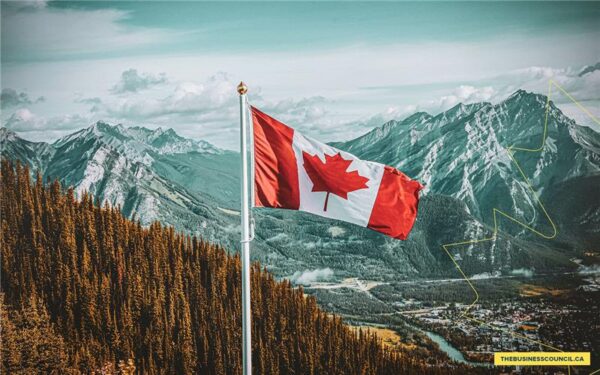Canada’s energy: Living up to our superpower
Greg Ebel’s speech presented to Toronto Region Board of Trade on October 6, 2023
Let me first thank Giles Gherson and the Board of Trade for affording me the opportunity to speak to all of you today. I also want to thank the many friends and colleagues – old and new – who decided to be with us even as we go into a holiday weekend. I appreciate it.
You see, whenever I speak in Ontario it feels like something of a homecoming for me. I was born here in Ontario. And while I work for a company headquartered in Alberta and have offices and homes in Calgary and Houston, this is very much my home.
This is where for me it began… and I am a very proud Canadian…and very proud to be from these parts. My father’s family descendants came as United Empire Loyalists in the late 1700s during a “spat of unpleasantries in the colonies”. They made a wise choice when the opportunity presented itself.
Our lives are defined by such opportunities – the ones we seize…. and the ones we miss. The same is true in the life of a country. The decisions we make – the doors we choose to open – they shape our future. They determine our prosperity. And ultimately, they serve as our legacy.
So, today I want to make the case for Canada, and more specifically Central Canada, to answer the call and play an outsized and important global role – much as it has in the past. That is to energize the world, help lower global emissions, reduce energy poverty and support progress of Indigenous communities at home.
The question is will we?
In 1939 – of its own free will and without hesitancy, Canada entered World War II that September because it realized then that Hitler threatened the very existence of Western civilization. And lest we forget, by 1944 – our army had about half a million soldiers of which more than 80 percent were volunteers for overseas services.
When Pearl Harbor was attacked by the Japanese, Canada declared war against Japan a day before the United States. No hesitancy – just action and leadership. Central Canadians bore much of the sacrifice and the call to lead in World War II.
In 1956, the world was entering, at a frightening speed, the Cold War and the Suez Canal Crisis mushroomed into a dangerous situation that was spinning out of control with Egypt, Israel, France and the UK playing a dangerous game.
Enter a great Canadian — a Central Canadian — Lester Pearson who proposed and was successful in the creation of an impartial United Nations peace keeping force which “eased” the French and English out of the Suez and inserted itself between fighting Israeli and Egyptian forces. For this, Lester Pearson won the Nobel Peace Prize and the world took notice of Canada as a global problem solver.
In the late 1980’s, another great Canadian went toe to toe with the Iron Lady, Margaret Thatcher at the height of her power as UK Prime Minister. Prime Minister Brian Mulroney cajoled, pushed and demanded that the Commonwealth stand united in the repudiation of apartheid and for the full and equal participation of all South Africans in the governing of their country. By 1990, that principled foreign policy leadership helped lead to Nelson Mandela’s release from a South African prison. The next day he called Prime Minister Mulroney thanking him and Canada for its vigorous efforts to end apartheid. A few months later, Mr. Mandela stood before the House of Commons and thanked all of Canada.
Principled leadership on a global scale.
With that reminder of our principled policy past that clearly helped those beyond our borders, let’s fast forward to today. Canada is again staring a major global leadership opportunity straight in the eyes.
In Ottawa – and in capitals throughout the world – many a policy maker and environmental activist have talked of the urgent need to reduce emissions and address climate change. Prime Minister Trudeau just last November said: “Climate action can’t wait.” I agree. But our government’s response – to date – unfortunately has been more local than global.
Our government has committed that Canada will be net zero by 2050 – just like many others – and further refined its goals for 2030. But Canada accounts for 1.4 per cent of the world’s CO2 emissions. And yet below the surface Canada has vast reserves of natural gas – and oil of course — that if used to displace coal in Asia and Eastern Europe could have a far greater impact on reducing global emissions than the impact Canada will have by achieving its own 2050 net zero commitment.
We have a chance to help the world move closer to realizing its critically important emissions goals at a pivotal moment in our history. And we can do that while strengthening the Canadian economy – creating good new jobs, supporting Canadian families, and making the most of an important natural resource.
In other words, we have before us an opportunity that is good for global emissions reductions, our economy and Canada’s historic global brand. That is the very definition of a modern win-win-win. But we hesitate. Just as we should be leading. We need to step up… as we did in 1939, 1956 and 1990.
If the moment is urgent, you would think we would not hesitate. And you would think we would not actively work against our own interests for the good of Canadians. And for the good of the planet and for the millions and millions of people in the world who through no fault of their own find themselves without access to energy which is a critical enabler of education, health care, technology and a good quality of life.
Now is indeed an urgent moment. Let’s talk about what’s standing in our way – and what we can do about it. And what collectively you in central Canada can do about it – must do about it. Keeping in mind our history: 1939….1956….1990.
But first – cards on the table. As Giles’s introduction said, and I shared earlier…I’m not your typical energy guy. I was born here in Ontario, studied at York University and since leaving the Mulroney administration, I’ve worked in Toronto, Chatham, DC, Vancouver, and Houston before coming to Enbridge in Calgary earlier this year.
So, having lived in multiple places, perhaps I’m lucky to have benefitted from being exposed to a broad array of Canadian views on energy and think of Canadian energy as a resource that has enabled and driven economic success and supported societal opportunity at key points in our economic history. Which is why it’s so important that we appreciate the scope of that opportunity and better appreciate the responsibility it presents to us today.
It is not a pipe dream. It is not a “what-if” or a “here’s-hoping.” It’s a sure thing – a slam dunk – a quick slap shot. It’s natural gas. And it’s plentiful, available and reliable. And for consumers, it is affordable. We can’t meet our heating, cooling or electricity demands here in Canada without it. But that’s just a start.
Natural gas is an energy backbone of industry and manufacturing, here in Ontario and beyond. For context, in Ontario, natural gas provides twice the energy of electricity at a quarter of the cost excluding the tax-based subsidy for electricity of ~$6 billion a year. That is a good illustration of its criticality in driving the province’s economic development today and going forward.
And because it partners well with renewable sources of energy, it will help to support the evolution to a more electrified future in the years ahead. Just look down the QEW to Dofasco in Hamilton. They’re phasing out coal-fired steelmaking – and turning to natural gas to help achieve net-zero emissions. Their emissions footprint will be significantly reduced by 2028. It’s all part of a bigger energy evolution here in Ontario – with natural gas at its core.
The best part: our country has enough natural gas to meet domestic needs for 200 years or more. And so we have the freedom to look beyond our borders or better stated, we have an obligation to look beyond our borders. And we must consider the benefits of export – benefits that go far beyond economic returns.
Yes, massive facilities and ships are required to liquify and transport the gas overseas. But bringing liquefied natural gas – or LNG – to global markets helps support energy security and lower energy prices, which helps everyone avoid energy poverty.
Here’s the kicker: Natural gas is a lower-carbon source of energy – about half the impact of coal. And it’s even more sustainable when it comes from Canada, which is among the cleanest producers in the world. Just to be clear: Coal may feel like something of a relic in many parts of North America. But it’s still the source of 40 per cent of the world’s electricity – and, of course, a source of significant amounts of pollution and emissions. Any serious energy and climate policy needs to prioritize the worldwide transition away from coal. It can be done. In fact, there’s proof just south of us.
In the past 15 years, switching from coal to natural gas has accounted for nearly two-thirds of all U.S. greenhouse gas emissions reductions. That same formula worked here in Ontario a decade ago. This province ended its reliance on coal-fired electricity – in favour of natural gas and other energy sources. In terms of greenhouse gases, it was the equivalent of taking seven million cars off the road. Canadian LNG can help this happen around the world. We can play a positive role – and feel the pride of doing so. LNG can also help drive economic growth and opportunity – by connecting more people in the developing world to an affordable and sustainable source of power.
So what’s the challenge?
When it comes to LNG, Canada has so much potential – on paper. And I mean that literally. Pick up any report about the future of LNG, flip through the pages, and you’ll learn that Canada has the world’s second-largest number of LNG projects that are at what’s known as the “pre-final investment decision” phase. We have the resource. We know how to transport it. We have the ingenuity to get it done. We have the interest of our trading partners.
On paper, we stand poised to become the world’s largest exporter of liquefied natural gas. On paper, we stand poised to reap the economic benefits. But we’ve been standing “poised” for years now.
Since 2012, Canada has been on the cusp of benefitting from LNG exports. At one point, more than a dozen projects seemed ready to roll. We were positioned to lead. But our exports today are the same as they were back then: zero. It’s been a lost decade.
Meanwhile, and this should be amongst the most upsetting fact to Canadians, other countries have taken action. In seven short years, the U.S. has become the world’s leading exporter of natural gas. By next year, they’ll be shipping more than 13 billion cubic feet of natural gas, every single day – enough gas to fuel one billion people in developing countries. And more terminals are coming online in the years ahead. An entire industry built from scratch. An industry that is contributing to economic success, global emissions reductions, energy poverty reductions abroad and energy affordability at home.
Today, our company supplies natural gas to five LNG facilities. They’re all in the United States. Americans are the ones seeing many of the benefits of Canadian natural gas.
What is Canada doing? We’re moving slowly. Too slowly. Canada has one LNG terminal currently under construction – in Kitimat, B.C. There’s another that’s been approved – Woodfibre – which we have a 30 percent investment in.
This isn’t about mimicking the Americans. It’s not about what they’ve done. It’s about what we could have done – and what we still can do if we get moving. It’s about seeing the global forest and not just a knot in one of our gorgeous Canadian maples. LNG investment has been drawn to the U.S. Gulf Coast because global companies are confident their projects can get off the ground in a reasonable timeframe.
There is a clear signal that LNG is part of the equation – part of the future. But even with the U.S. expansion, there’s still plenty of room for Canada to be a serious player. We have countries knocking on our door. Our allies are knocking on our door. Germany, Japan, South Korea … they’re not shy about it: They want to buy Canadian gas. And they’re not alone.
As an aside, two of these are G7 countries – our greatest allies. Canada is not a military superpower nor an economic superpower. We are an energy superpower and using that power for good when asked by our allies is more than a fair price to maintain our G7 status and reputation. In my experience, if you constantly decline invitations from your friends you soon receive no more invites.
Around the world, a lot of nations have reserves of natural gas. But far fewer are established, respected democracies – countries that can be relied on for security of supply and stability of delivery. And fewer still are committed to improving environmental and social outcomes like we are. Yet we continue to hesitate.
Germany just built an LNG import facility in barely a year. With the ongoing war in Ukraine, they’re desperate for new sources of energy. And still we hesitate to lead.
And let’s just go ahead and be candid about why. Building and operating an LNG facility – it requires a lot of construction and a lot of power. It therefore takes a degree of political courage to go all-in on LNG – because in some cases, for some facilities, it may mean more domestic Canadian emissions. But, it will also mean a sizable net benefit as we help reduce the 98.5 percent of emissions that are produced beyond our borders.
More natural gas means less coal. Less coal means fewer emissions. And that’s the goal, right? The goal is tackling a global problem in a global way. The goal is getting the job done.
It’s all right there in the Paris climate agreement – Article 6. Nations can be credited for tangible emissions solutions that extend beyond their borders. This is worth dwelling on for a moment – because it really gets to the core of the issue. If we’re serious about confronting the climate and emissions challenge, what’s the best way to do it? How should we think about it?
As Canadians, we absolutely, 100 per cent should think about emissions reduction and cleaner energy on an individual level. Our choices matter. How we live. The vehicles we drive. It all matters. Same goes for companies. Their choices and actions matter. At Enbridge, for example, we’re working to reduce our own emissions intensity by 35 per cent over the next seven years. And we’re driving industry solutions to mitigate methane emissions.
We should also think about the emissions reductions and climate challenge on a national level. For instance, Canada can pull together as a people – and put in place the kinds of policies that will encourage the development of renewable energy sources. But we can’t leave out the most important element of our climate thinking: We should – we must – think about our changing climate on a global level. Because it is a global issue, a global concern, a global challenge.
Our goal as individuals, as a nation, and as a global community must be to reduce emissions across our planet as a whole. And LNG helps get us there.
We sometimes hear from some government officials that an LNG economy is a strategic priority for Canada. But what we see is hesitation. And we see roadblocks to progress – in the form of regulatory conditions that are quite simply impossible to meet.
There was a column in the Globe and Mail this summer which summed it up nicely. It said: “Canada doesn’t have to build an LNG industry. But we need to be honest about the benefits of doing so – and the costs of not doing so.” End of quote. At this crucial stage, we shouldn’t be taking options off the table.
The world recognizes the value of Canada’s vast natural resources and the impact those resources can have for energy security, reliability – and importantly – reducing global emissions. The Canadian public gets it, too. A recent poll found that more than two-thirds of Canadians think we should make a greater effort to export our energy – because it’s in our shared interest.
Let me also say, I believe that our LNG resources can help Canada make meaningful progress toward Indigenous reconciliation. This is important to Enbridge – and to me, personally. And I believe it’s important to most Canadians.
Many Indigenous groups have natural resources that they want to develop. They want to build a better future for themselves – and for the generations to come. The energy industry has an opportunity – in fact, I would argue it has an obligation – to help them become full economic partners.
At Enbridge, we’ve seen firsthand how important equity partnerships are in empowering Indigenous communities – and helping them pursue long-term financial stability and new revenue sources.
Here’s the issue: Indigenous groups often struggle to access capital. A Federal Government Indigenous loan-guarantee program for all forms of energy development is needed. There are already successful loan-guarantee programs at the provincial level in Alberta, Saskatchewan, and Ontario. These can be used as a model. But to truly take advantage of the opportunity, a national program that is also open to conventional energy is required.
And while I’m on this point, I fear we risk showing developing countries that we think we know what’s best for them. If we try to dictate our “enlightened” views on other societies – – as I said earlier, on people who often don’t have access to energy and hence a dramatically poorer quality of life – – we risk looking like we have learned nothing from our own past.
If, on the other hand, we support these nations in the choices they make about energy that are best for them, we will show humility and respect for their decisions. And, in doing so create opportunity for Canadians to use our power for good. Just as we have when the world needed us in the past.
I sometimes hear our government officials talk about the need for Canada to bolster its influence on the global stage. Our foreign affairs minister has discussed it at length. She has specifically referenced the imperative to be a reliable partner in the Indo-Pacific region. Those relationships begin with diplomacy and shared values. But they could be immeasurably strengthened by the export of LNG – which can help countries grow their economies, reduce emissions, and achieve energy security and affordability.
In 2025, when the Kitimat LNG facility opens, it will be capable of exporting 14 million tonnes of LNG each year. That’s only about 15 per cent of what Australia ships. In other words, Kitimat is a good start. But it’s only a good start.
As a country, we have punched above our weight in the past. We’ve done it on an economic level – with the creation of the G20 and our leadership in the face of financial crises. We’ve done it on a global level – from our heroic efforts in world wars to Prime Ministers Pearson and Mulroney defining a role for international peacekeeping and fighting the scourge of apartheid. We’ve never been afraid to look beyond our borders to make a positive difference. We’ve always been at our best when we’ve aimed high – and acted with confidence in the world.
Nation building is never easy. Global influence is even harder to achieve. But that’s the kind of potential that LNG has. That Canada has. It can be a defining moment for our country – a moment when we decide to make the most of our resources and contribute in a real and lasting way to reducing global emissions. A time when we support our own energy transition – while helping others do the same.
For this to happen, we need leadership – and we need action. We need government to champion the sustainable and beneficial production and export of natural gas, for the collective good of our country, our allies, and our planet.
There’s no question – reducing the world’s greenhouse gases should be treated as an urgent matter. Canada has the ability and opportunity to do more than that. Spurring Canadian LNG exports to nations and peoples who want to displace coal power generation for lower carbon energy would deliver a greater reduction in greenhouse gas emissions for the planet than the act of Canada meeting its own net zero commitment.
I’ll say it again: Lives are defined by opportunities – the ones we seize and the ones we miss.
So, here’s my message: our country is uniquely positioned to be a leading exporter of LNG for decades to come. We have the supply. We have sustainable production. We offer short travel times. We are the complete package.
But we have a choice to make. And let there be no doubt: inaction is a choice. Indifference is a choice.
As Western Canadians, as Eastern Canadians, and yes as Central Canadians, let’s opt in to play our historical role… to think not just about ourselves… but of the larger role we can play to enable an even better outcome for the entire world –and let’s push our leaders to make it so. Let’s move with pace and purpose to embrace the role that natural gas can play in creating jobs, strengthening our energy security, and supporting our domestic economy. Let’s put in place a process that enables the responsible and efficient development and export of this important resource… and better streamline the regulatory processes… to better respond to the urgent need. Let’s also implement – right now – a national Indigenous loan-guarantee program to ensure that Indigenous communities have a seat at the table and equity that can better enable a more prosperous future – and a chance to benefit from important natural resources.
And let’s show our allies and the world that we are ready to make a serious and lasting contribution to reducing global emissions – by providing a cleaner source of energy to countries that need it and want it. And yes, even if that means our own relatively small emissions targets take longer to achieve.
When it comes to LNG, we can no longer be first. On the energy and sustainability fronts we can still be best. We can still be a global leader, a role model for responsible energy production, and a positive force in creating a better future across Canada and throughout the world. We can yet again as a country answer the call and make a historical contribution to the world’s progress.
It’s time for our leaders in government and industry to rise to the challenge.
Thank you for being here today. Thank you for listening. And thank you for your commitment to realizing Canada’s rightful position in the world.









